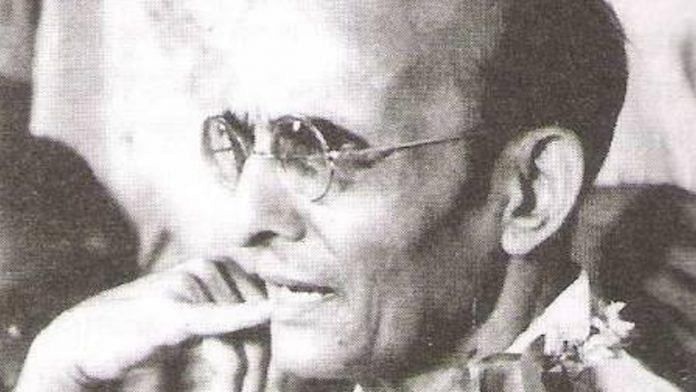New Delhi: Indian freedom fighter Vinayak Damodar Savarkar may have always been demonised by Marxists — including historians and the intelligentsia — for his views on the ideology of Hindutva, but it was none other than Karl Marx’s grandson who defended him after his daring escape to France from British captivity.
Jean-Laurent-Frederick Longuet (1876–1938), a French socialist, politician, journalist and lawyer, not only stood in the International Court of Justice in The Hague to defend Savarkar, but also praised him for his bravery, patriotism and intellect.
Marx’s grandson was born to Charles and Jenny Longuet, Karl Marx’s daughter, in London. The family had later moved to France, where Jean Longuet worked as a journalist and got trained as a lawyer. He was also the founder-editor of French newspaper Le Populaire and was a prominent socialist leader in France.
How Savarkar escaped from British vessel
In a daring escape from ‘Morea’, a British merchant vessel that was carrying him from Britain to India to start a trial against him for his revolutionary activities, Savarkar reached the French shores on 8 July 1910. He had jumped into the sea through a porthole and swam to Marseilles.
While being pursued by British policemen from the vessel, he was captured by a French police officer, who returned him to Morea, which sailed the following day with Savarkar on board.
Subsequently, France demanded the restitution of Savarkar on the ground that his delivery to the British officers on board the vessel was contrary to the rules of international law, and, upon Britain’s refusal to comply, the dispute went to a tribunal for arbitration. Permanent Court of Arbitration members August M. F. Beernaert of Belgium, Earl of Desart of England, Louis Renault of France, Gregors Gram of Norway and A. F. de Savornin Lohman of Holland were part of the tribunal.
Arguments in the case began on 14 February 1911, and ended 17 February 1911. The decision was delivered on 24 February 1911 in favour of Britain. Savarkar was later imprisoned by the British at the Cellular Jail in Andaman, infamously known as ‘Kala Paani’.
Also read: Gandhi admired Hindutva icon Savarkar as ‘lover of truth’, addressed him as bhai
Marx’s grandson on Savarkar
While the Marxists in India oppose everything related to the ideology of Hindutva, Marx’s grandson Longuet, who also followed his grandfather’s ideology, had found nothing wrong with Savarkar being a ‘Hindu nationalist’. Rather, it appeared, he not only appreciated Savarkar but was also a great admirer of the freedom fighter and his beliefs.
Here is what he said in his appeal about Savarkar: “Mr. Savarkar took, from an early age, an active part in the agitation of the Hindu nationalist party, his two brothers, who were no less militant than he was, were sentenced, one to life imprisonment and one to several months imprisonment for their participation in the Nationalist movement, are currently imprisoned.”
He added: “From the age of 22, a law student at the University of Bombay, he became the assistant of the famous Hindu, Tilak, and formed about the same time, in his native city, in Nasik, a national association known as the Mitra Mela, which like so many similar organizations, was engaged in an active propaganda throughout the Deccan, forming gymnastic societies, organizing meetings, where were read the biographies of the great national revolutionaries such as Shivaji and Ramdas and foreign ones such as Mazzini, whose memoir was fervently worshipped by Mr. Savarkar.”
Longuet continued: “With his elder brother Ganesh, Sarvarkar was preaching everywhere with passion, the gospel of national independence, advocating armed uprising of his countrymen, according to the teachings of the founder of Italian independence. The rallying cry of the young nationalist was the cry which has since become famous throughout India ‘Vande Mataram’ (‘Hooray for the fatherland! “). In 1906, Mr. Vinayak Damodar Savarkar came to reside in England to complete his legal studies and be admitted to the bar in London, Gray’s lnn section. He was 24 years old and filled with passion for revolutionary agitation in the colony of the great Hindu city, grouped around the lndla House, an institution created by a rich fellow.”
“Mr. Krishnavarma, a former minister of one of the native states of Bengal, founded a chair at Oxford, dedicated to Herbert Spencer. Upon his arrival in the ‘India House’ Savarkar wrote the preface to a translation into Marathi of the ‘Life of Mazzini’. Soon after, he began and finished a complete history of the ‘War of Independence’ in 1857, called by the British writers the ‘Great Mutiny’ (This book, a real scientific value, was translated into English by several residents of India House and was published under the anonymous signature).”
Most importantly, Longuet said: “The last paragraph of his conclusion is characteristic of the thinking behind it: The Revolution of 1857, he wrote, is the test that showed how far India was in the path of unity, independence and popular force. Its failure was caused by men without energy, effeminate, selfish traitors who helped the enemy. But those who, bearing the sword, stained with their blood still warm, walked cheerfully to the fire and the battle to the death — not even a single voice rises to criticize these heroes! They were not fools, they were not reckless and they are not responsible for the defeat and that is why we cannot blame them. It is their call that has awakened Mother India from her deep sleep to march forward to overthrow slavery.”
(The writer is a research director with Delhi-based think-tank Vichar Vinimay Kendra. He has authored two books on the RSS. Views expressed are personal.)
Also read: As a teenager, Savarkar tried to destroy a mosque & was sad Hindus weren’t united



